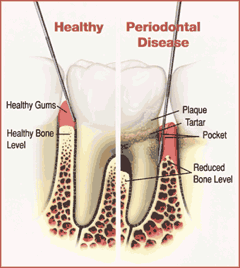Gum Diseases
Gingivitis Disease
 Gingivitis, a common gum disease, is inflammation of the gums without associated bone loss. Gingivitis is often the first stage of periodontal disease and is caused by bacterial plaque that accumulates in the small gaps between the gums and the teeth. These accumulations may be tiny, even microscopic however, the bacteria in them produce foreign chemicals and toxins that cause inflammation of the gums around the teeth. This inflammation can result in deep pockets between the teeth and gums and left untreated can lead to more serious forms of periodontal disease called, periodontitis.
Gingivitis, a common gum disease, is inflammation of the gums without associated bone loss. Gingivitis is often the first stage of periodontal disease and is caused by bacterial plaque that accumulates in the small gaps between the gums and the teeth. These accumulations may be tiny, even microscopic however, the bacteria in them produce foreign chemicals and toxins that cause inflammation of the gums around the teeth. This inflammation can result in deep pockets between the teeth and gums and left untreated can lead to more serious forms of periodontal disease called, periodontitis.
Periodontal Disease
Periodontitis, also known as gum disease or periodontal disease, is a chronic bacterial infection. The bacteria in the mouth activate a person’s immune system and as a result, inflammation occurs around the teeth and under the gums. Chronic inflammation results in progressive bone loss around the affected teeth. Periodontal disease is often painless and most patients are not aware they have a problem until examined by a dentist. If left untreated, the inflammation can destroy the bone around the teeth. Periodontal disease is the leading cause of tooth loss in adults.



